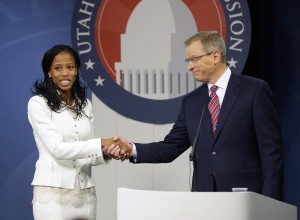
Utahns get to test drive a new election-season tool for this year’s midterm elections: the Utah Debate Commission.
This largely unprecedented and groundbreaking organization is a collaboration of representatives from media organizations and higher educational institutions, along with civic and business leaders. Utah is only the second state to have a formal debate commission, joining Indiana, whose commission was founded in 2007.
“Informing constituents about the candidates and where those candidates stand on issues that impact the state of Utah was the goal,” said Nena Slighting, executive director of the commission. “We wanted to provide as much access as possible to Utah voters.”
The idea came from BYU political science professor Richard Davis, who saw civic engagement in Utah steadily declining over the past decade, perhaps due to the inconsistency of debates being readily available to voters in the state.
“I felt it was important to increase the exposure voters had to candidates beyond soundbites and advertisements,” he said. “Placing the candidates in a position where they answer voters’ questions and then televising that encounter broadly would help improve candidate communication, voter knowledge and, hopefully, public participation in the electoral process.”
Although candidate debates have been a part of the electoral process in Utah for more than 30 years, the fact that commercial media outlets joined the public stations in broadcasting and participated in this year’s debates is new.
“It’s rare for commercial stations in any market to give up prime time for politics,” said BYU professor David Magleby, who acted as moderator for one of the debates.
Each of Utah’s six major commercial and public networks, FOX 13, KBYU, KSL, KTVX, KUED and KUTV, made an effort to broadcast the debates live, as did several radio stations and online streaming outlets.
“They were very willing and did this at a great sacrifice to their stations and as a public service effort,” Slighting said. “So we need to commend all the stations for participating.”
The commission also focused on presenting the candidates with questions exclusively provided by voters.
“We wanted the citizens and students where the debates were held to come up with the questions,” Slighting said. “So all of the questions were directly related to a specific student or citizen who had an issue that they wanted the candidates to discuss in the debates.”
Following Tuesday’s election, the commission will meet to discuss possible changes to the debate format and the overall process.
“As many questions as we answered in 2014, we raised an equal number of questions for going forward in 2016,” said Ken Verdoia, KUED director of production and member of the Utah Debate Commission Board of Directors.
One of the issues they will explore relates to the form in which questions are submitted and presented to the candidates.
“Is it appropriate to depend on the public to ask questions in advance of the debate, or should they actually ask those questions live from a studio audience?” Verdoia said.
Overall, those involved with the Utah Debate Commission said their addition to the election cycle was a huge success.
“The debates were the most-watched politically focused program in the past 20 years here in Utah,” Slighting said. “We feel overwhelmingly positive about the outcome of the debates.”
Video and audio of the debates are available at utahdebatecommission.org.




